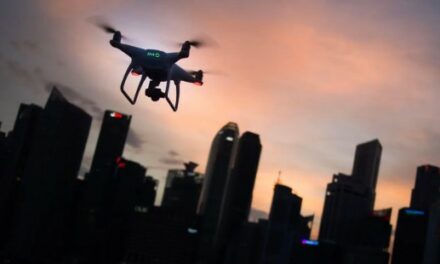We support our Publishers and Content Creators. You can view this story on their website by CLICKING HERE.
From Arizona to New Jersey: unexplained aerial activity raises national security concerns
- Arizona has seen an unusually high number of encounters with unidentified aerial phenomena (UAPs) and advanced drones, with notable incidents near Davis-Monthan Air Force Base.
- In 2021 and 2016, Customs and Border Protection helicopters encountered agile, green-lit drones that displayed remarkable evasiveness, suggesting sophisticated capabilities far beyond civilian or government drones.
- Since November 2023, coordinated drone operations have been reported in New Jersey, with large drones operating up to six feet in diameter, equipped with evasive blinking lights making detection difficult.
- Reports of U.S. military aircraft collisions with unidentified drones in Arizona’s military training ranges underscore potential safety risks and highlight the threat to national security.
- There is frustration with the disjointed and sometimes vague responses from federal agencies, highlighting a critical gap in the government’s ability to effectively investigate and respond to these aerial anomalies.
- The sophisticated capabilities of these drones and UAPs, including their ability to evade detection, raise concerns about potential espionage, surveillance, and threats to national security
Unidentified aerial phenomena roaming in multiple cities
Reports of advanced drones and unidentified aerial phenomena (UAPs) have surfaced recently, raising questions about the true intentions and capabilities of the mysterious crafts. At the heart of this unfolding mystery is Arizona, a state that has seen an unusually high concentration of these encounters. From the eerie and agile green-lit drones over Tucson to the coordinated aerial incursions over New Jersey, the situation is becoming increasingly perplexing and alarming for both civilians and law enforcement.
In February 2021, the airwaves over Tucson, Arizona, crackled with uncertainty as a Customs and Border Protection helicopter encountered a drone that seemed to possess capabilities far beyond any civilian or government-issued UAV. The drone was described as a quadcopter-like platform with a dim, green position light, and it displayed remarkable agility and evasiveness, evading both the CBP and Tucson Police Department helicopters with ease. This incident was not an anomaly; a similar encounter had occurred in Tucson in 2016, with identical characteristics. The fact that these incidents took place near Davis-Monthan Air Force Base suggests that the airspace above this crucial military installation may be a recurring target of these elusive and sophisticated drones.
Fast forward to New Jersey, where a different but equally perplexing scenario has emerged since November 18, 2023. Reports of large drones, estimated to be up to six feet in diameter, have been circulating every night for weeks. State and local authorities assert that these drones operate in a coordinated manner, making detection and identification highly challenging. The drones are reported to be equipped with blinking lights that can be turned off, rendering them nearly invisible to traditional detection methods, including infrared cameras. This evasive behavior has raised concerns about potential surveillance on critical infrastructure and has led to the imposition of Temporary Flight Restrictions (TFRs) around key facilities like Picatinny Arsenal and nuclear power plants.
Who is behind these drones?
The question of who is behind these drones and their exact intentions remains unanswered. While federal authorities have repeatedly stated that they are not sure of any “credible threat,” the lack of definitive information is troubling. Local officials have expressed frustration with the muddled messaging from federal agencies, which often results in vague and unsatisfying explanations. The situation highlights a critical gap in the government’s ability to effectively investigate and respond to these aerial anomalies, leaving the public to grapple with a cocktail of anxiety and uncertainty.
Adding to the enigma is a series of encounters between U.S. military aircraft and unidentified objects in Arizona’s military training ranges. Fighter jets flying in restricted airspace have reported sightings of small “objects” flying in groups, sometimes at high altitudes and speeds. One such encounter even resulted in a mid-air collision between an F-16 and an unidentified drone, underscoring the potential safety risks posed by these aerial incursions.
The increasing frequency and sophistication of these encounters suggest a broader issue that extends well beyond isolated incidents. It is clear that the U.S. government, particularly the military, is struggling to address this growing threat. The disjointed response mechanisms, from the FAA’s incident logs to the Air Force’s Hazardous Air Traffic Reports, are often overly redacted and fail to provide comprehensive insights into the true nature of these encounters.
This inability to accurately identify and categorize the aerial phenomena could have far-reaching implications. The sophisticated capabilities exhibited by these drones and UAPs raise concerns about potential espionage and surveillance activities. Furthermore, their ability to evade detection could be indicative of a larger, coordinated effort to compromise national security.
Sources include:

 Conservative
Conservative  Search
Search Trending
Trending Current News
Current News 





